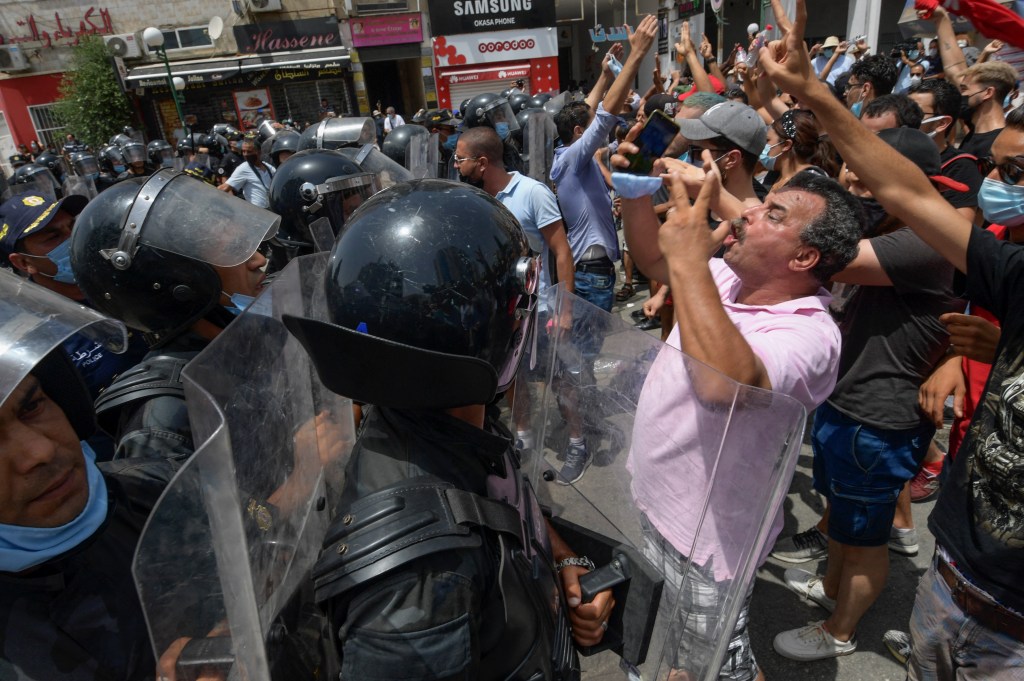On July 25 and 26, 2021, protestors and security forces in Tunis, Tunisia, assaulted and harassed at least six journalists covering demonstrations, according to news reports, journalists who spoke to CPJ and posted their experiences on social media, and a statement by the National Syndicate of Tunisian journalists (SNJT), a local trade union.
The journalists were covering anti-government demonstrations in the city’s Bardo district, which began on July 25 after President Kais Saied fired Prime Minister Hichem Mechichi and suspended parliament, according to news reports.
On July 25, unidentified protestors threw rocks at Yassine Gaidi, a photojournalist at the Turkish-owned Anadolu Agency, hitting him in the head and feet, according to a Facebook post by the journalist, news reports, and the SNJT statement.
Gaidi received stitches on his legs at a local hospital following the attack, and was released the same day, according to those sources and a Facebook post by photojournalist Hamzaa Kriistou, who witnessed the incident.
Also during that demonstration, protesters threw rocks and water bottles at Yosra Chikhaoui, a reporter for the independent news website Hakaek Online; Zied Hosni, a reporter for privately owned radio station Shems FM; and freelance photojournalist Mohamed Tata, according to news reports, the SNJT statement, and Chikhaoui, who spoke to CPJ via messaging app.
Chikhaoui told that she received multiple bruises on her body from the objects. Hosni was hit in the chest and legs, and Tata was hit in the legs, according to those sources and a Facebook post by Hosni, which did not specify the extent of their injuries.
Also on July 25, security forces grabbed Kriistou, a photojournalist for the state-run news agency Tunis Afrique Presse, by his back and arms to stop him from covering the protests in Bardo, according to the SNJT statement and a Facebook post by the journalist.
On July 26, protestors shoved Walid Abdallah, a correspondent for Saudi news channel Al-Arabiya, and called him a spy while he attempted to cover the protests, according to a report by his employer, which included a video of the attack.
Also on July 26, Tunisian security forces raided the Tunis office of Qatari broadcaster Al-Jazeera, ordered staff to leave the building, and confiscated equipment, CPJ documented at the time. As of today, the office remains closed, and its staff is obliged to work remotely without having access to their professional equipment, according to the broadcaster’s Tunis bureau chief, Lotfi Hajji, who spoke to CPJ via messaging app.
Separately, on July 28, plainclothes police officers briefly detained a New York Times reporting team consisting of Cairo Bureau Chief Vivian Yee, Tunis correspondent Massinissa Benlakehal, and a third journalist who did not want their name disclosed, according to a report by the newspaper and Yee, who communicated with CPJ via email.
The team was covering protests in Tunis’ al-Tamadon neighborhood when officers detained them and brought them to a local police station to check their documentation, according to those sources. Police held the team for about two hours, questioned Benlakehal, and then released the journalists without charge; Yee told CPJ she was unable to specify what officers asked Benlakehal about.
CPJ emailed Tunisia’s Central Police Office and Nouri Lajmi, the president of the Independent High Authority of Audiovisual Communication, the country’s broadcast regulator, for comment, but did not receive any replies.
